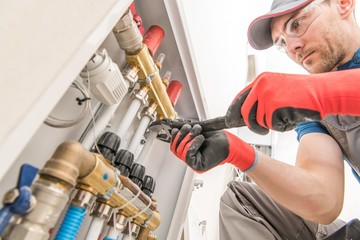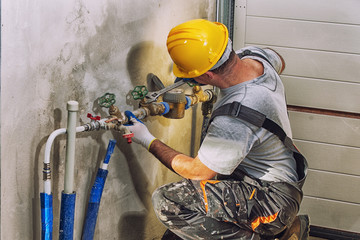Plumbers design and install pipeline systems that carry water, sewage, and other liquids around buildings. The plumber ensures these pipelines function efficiently and meet building codes and regulations.

Plumbing is an exciting, hands-on career with plenty of growth and advancement opportunities. However, it can be stressful when clients call for an emergency fix and expect the job to be completed within a short period of time.
Plumbers install, repair and maintain water and gas piping systems in homes, buildings and commercial establishments. They also install plumbing fixtures and sewage systems and manage fire sprinklers and drainage systems in an emergency. Typical duties of plumbers include reading and interpreting blueprints to assess or plan plumbing installations and meeting building code requirements for construction projects. They may also coordinate with other construction professionals to ensure that the job is completed according to schedule and within budget.
They must be able to solve problems quickly and efficiently and be able to work under pressure. They must also be able to listen well and politely respond to customers. Because many plumbing problems are emergencies that need immediate attention to prevent health and safety hazards, plumbers often work late in the evenings, on weekends, or during holidays. This can be stressful, but it is important to keep an even keel and remain level-headed during emergency situations.
Education and Training Requirements. Plumbers work to repair, install, and maintain water and gas piping systems in homes and businesses. They also inspect and repair septic and sewer connections. Generally, plumbers begin their careers through apprenticeships that last four to five years and are sponsored by unions or trade organizations. During these years, apprentices learn safety procedures, local plumbing codes and regulations, blueprint reading and piping systems.
Some people may choose to attend a few semesters of trade school before or during an apprenticeship. This can help them get a head start on their training and build their resumes with relevant experience. Several community colleges, vocational schools, unions and professional plumbing associations offer plumbing training programs. These can prepare you to enter an apprenticeship or begin your career in this rewarding and lucrative field.
Plumbers work in a wide range of settings and environments, including residential homes, commercial buildings, and construction sites. They install and repair water and piping systems, as well as water fixtures and electrical equipment. They perform physically demanding jobs that require flexibility, excellent motor skills and good vision. Plumbers also need problem-solving skills to solve complicated issues and ensure projects are completed on time.
Most plumbers and pipe fitters receive their training through four- to five-year apprenticeship programs that combine classroom instruction with paid on-the-job training. Those who have finished an apprenticeship may be eligible to obtain a state license to work independently. Plumbers also play a key role in protecting the environment by installing and maintaining safe, effective water and sewage systems. This helps prevent pollution that harms groundwater, streams, lakes, rivers and oceans as well as the life-forms that rely on those water sources.
Plumbers can earn a variety of salaries depending on their experience level, industry and state. Typically, apprentices make between $15 and $20 an hour, journeymen can make between $30 and $35 an hour and master plumbers can earn between $40 and $45 an hour. The average plumber salary is $57,000 a year, but it can vary greatly depending on a range of factors. This includes the industry a plumber works in, their years of experience and how much they charge for services.
Some of the highest-paid plumbers work for municipalities, such as City’s Housing Authority. A supervisor plumber in the agency earned a base pay of $100,627 but put in more than 2,249 hours of overtime in 2021.
The best way to increase your income as a plumber is by getting a promotion or starting your own business. However, this can be a difficult and time-consuming process. Other ways to boost your earnings include changing employers, gaining a higher level of education and managing your experience.

